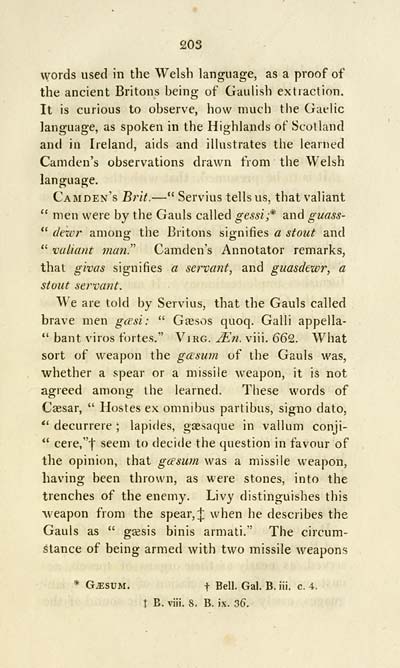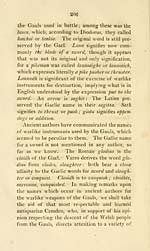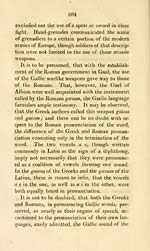Download files
Complete book:
Individual page:
Thumbnail gallery: Grid view | List view

203
vvords used in the Welsh language, as a proof of
the ancient Britons being of Gaulish extraction.
It is curious to observe, how much the Gaelic
language, as spoken in the Highlands of Scotland
and in Ireland, aids and illustrates the learned
Camden's observations drawn from the Welsh
language.
Camden's Brit. — " Servius tells us, that valiant
" men were by the Gauls called gessi;* and guass-
" dezvr amona: the Britons sianifies a stout and
" valiant manr Camden's Annotator remarks,
that givas signifies a servant, and guasdewr, a
stout servant.
We are told by Servius, that the Gauls called
brave men gcusi: " Gaesos quoq. Galli appella-
*' bant viros fortes." Virg. ^n. viii. 662. What
sort of weapon the gaisum of the Gauls was,
whether a spear or a missile weapon, it is not
agreed among the learned. These words of
Caesar, *' Hostes ex omnibus partibus, signo dato,
" decurrere ; lapides, gsesaque in vallum conji-
" cere,"f seem to decide the question in favour of
the opinion, that gcEsum was a missile weapon,
having been thrown, as were stones, into the
trenches of the enemy. Livy distinguishes this
weapon from the spear, J when he describes the
Gauls as " gsesis binis armati." The circum-
stance of being armed with two missile weapons
* G^suM. t Bell. Gal. B. iii. c. 4.
t B. viii. 8. B. ix. 36.
vvords used in the Welsh language, as a proof of
the ancient Britons being of Gaulish extraction.
It is curious to observe, how much the Gaelic
language, as spoken in the Highlands of Scotland
and in Ireland, aids and illustrates the learned
Camden's observations drawn from the Welsh
language.
Camden's Brit. — " Servius tells us, that valiant
" men were by the Gauls called gessi;* and guass-
" dezvr amona: the Britons sianifies a stout and
" valiant manr Camden's Annotator remarks,
that givas signifies a servant, and guasdewr, a
stout servant.
We are told by Servius, that the Gauls called
brave men gcusi: " Gaesos quoq. Galli appella-
*' bant viros fortes." Virg. ^n. viii. 662. What
sort of weapon the gaisum of the Gauls was,
whether a spear or a missile weapon, it is not
agreed among the learned. These words of
Caesar, *' Hostes ex omnibus partibus, signo dato,
" decurrere ; lapides, gsesaque in vallum conji-
" cere,"f seem to decide the question in favour of
the opinion, that gcEsum was a missile weapon,
having been thrown, as were stones, into the
trenches of the enemy. Livy distinguishes this
weapon from the spear, J when he describes the
Gauls as " gsesis binis armati." The circum-
stance of being armed with two missile weapons
* G^suM. t Bell. Gal. B. iii. c. 4.
t B. viii. 8. B. ix. 36.
Set display mode to: Large image | Transcription
Images and transcriptions on this page, including medium image downloads, may be used under the Creative Commons Attribution 4.0 International Licence unless otherwise stated. ![]()
| Early Gaelic Book Collections > Ossian Collection > Thoughts on the origin and descent of the Gael > (215) |
|---|
| Permanent URL | https://digital.nls.uk/82237024 |
|---|
| Description | Selected books from the Ossian Collection of 327 volumes, originally assembled by J. Norman Methven of Perth. Different editions and translations of James MacPherson's epic poem 'Ossian', some with a map of the 'Kingdom of Connor'. Also secondary material relating to Ossianic poetry and the Ossian controversy. |
|---|
| Description | Selected items from five 'Special and Named Printed Collections'. Includes books in Gaelic and other Celtic languages, works about the Gaels, their languages, literature, culture and history. |
|---|

